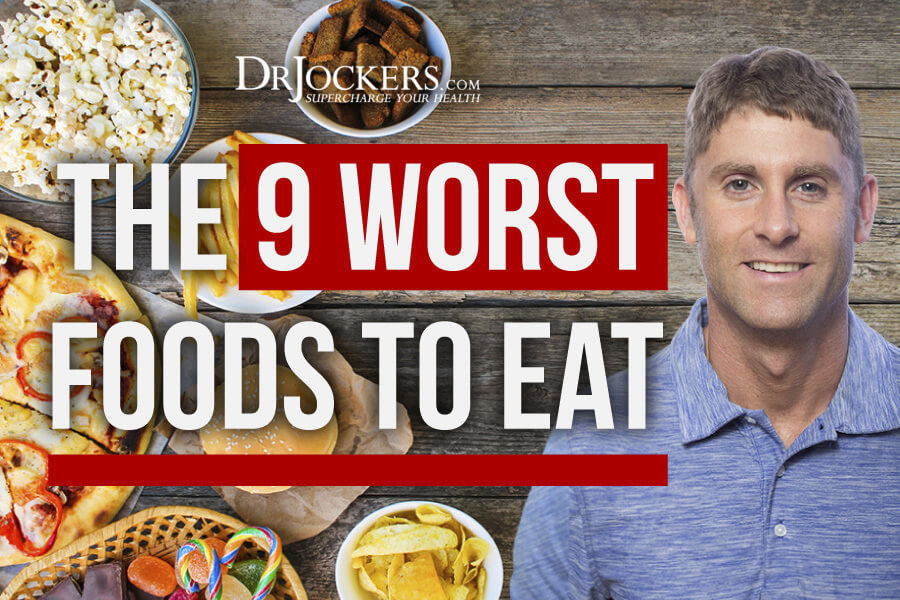 The 9 Worst Foods To Eat
The 9 Worst Foods To Eat
If you feel like healthy eating gets more complicated every day, I feel you. Paleo, vegan, low-carb, high-fat, organic, and the endless list of dietary terms can make it difficult to even begin eating healthy. Experiencing this feedback from my patients and followers for years, I completely understand where you are coming from. Here are 9 of the worst foods to eat, and healthy alternatives to swap them for.
That is why I have put together this article to lay the basis of the worst foods for your health, along with the foundational principles of a healing diet to support optimal wellness in the body. Some of these worst foods may come as a surprise because they are marketed by the media as healthy…but you will come to find out why you will want to avoid them!
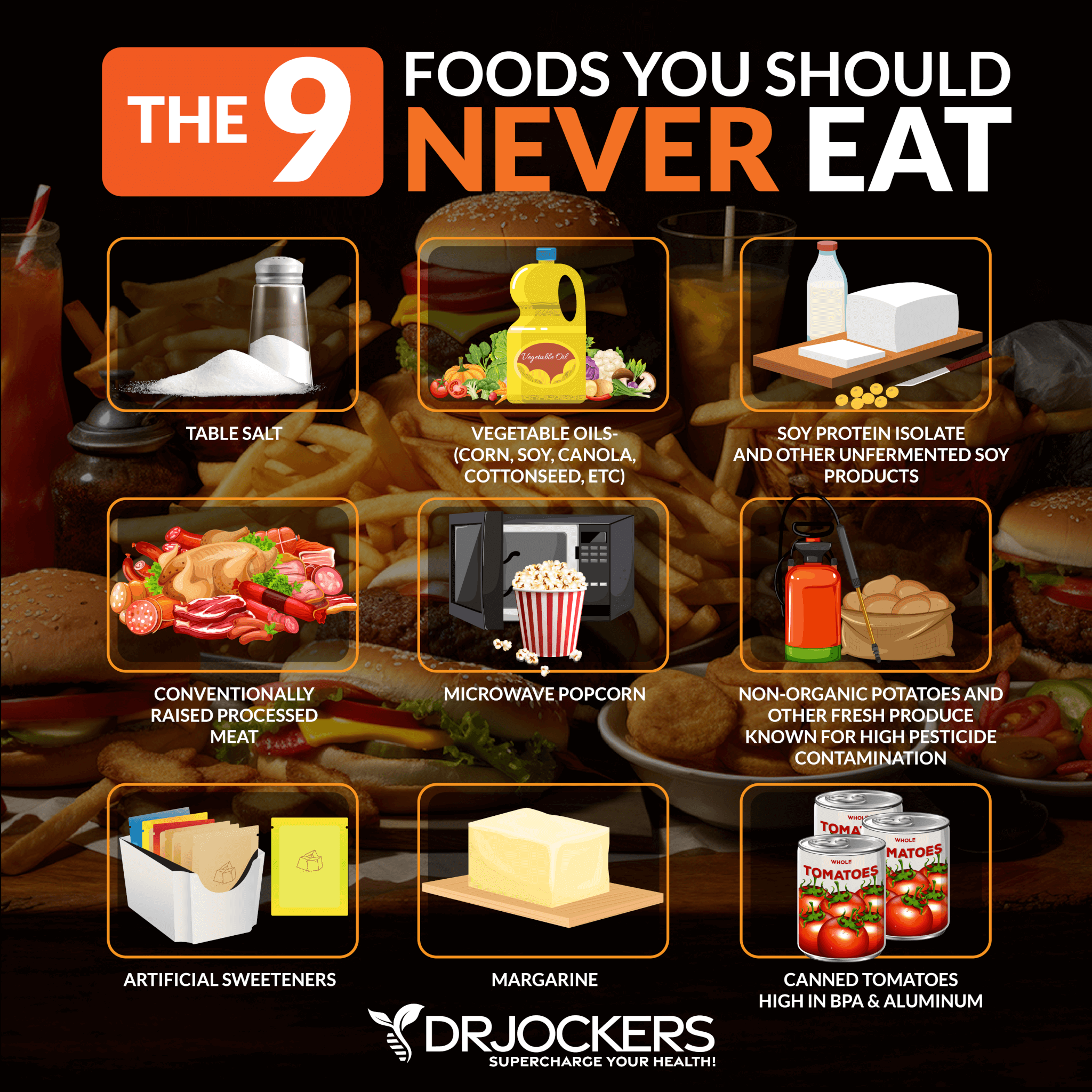
Note On Worst Foods
Although it is important to know which of the worst foods to avoid, it is never a good idea to be constantly fixated on what you can’t eat. Once you understand the foods to avoid, keep a mental note in the back of your head. Next, take to heart my healing diet nutrition principles and begin incorporating them into your life.
By doing so, you will begin to naturally avoid the worst foods for your health. Instead of feeling limited to a narrow selection of foods, you will experience liberation knowing that the foods that you are eating are adding to your vitality every day!
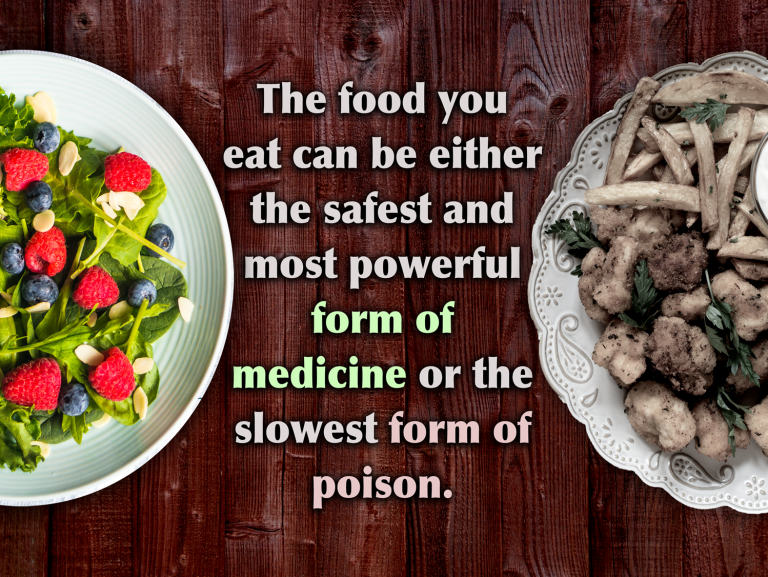
Table Salt
Commercial Table salt is nothing like the natural salts our bodies have been receiving for thousands of years. Naturally occurring salts from the earth contain sodium along with over 80 different trace minerals, all of which play an important role in the body.
Commercial table salt is a chemically synthesized sodium chloride along with other nasty additives that prevent it from clumping together. Additionally, these salts often contain things like aluminum and fluoride which I would never recommend putting into your body.
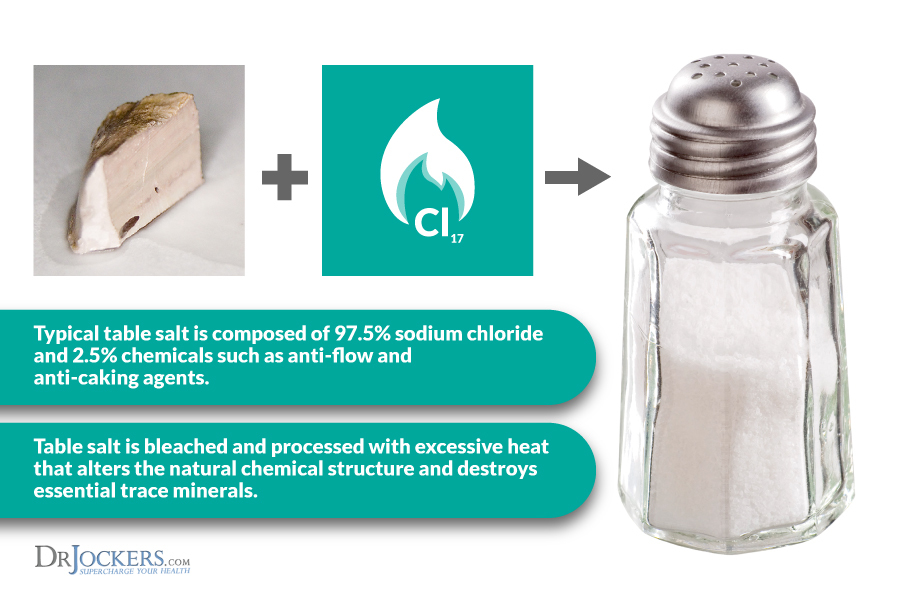
Alternative: Natural Salts
When it comes to salt, I recommend consuming generous amounts on your food. This is because the sodium and other trace minerals play a vital role as electrolytes that ensure your nervous system is working efficiently.
The salts I recommend are those from clean earth sources. This would include salts like Redmond’s Real Salt and Celtic Gray. The coloration to these unique salts is an indication of their mineral content.
If you are concerned about getting iodine, I would recommend using a seasoning that includes kelp like Herbamare or Braggs Sea Kelp Delight.
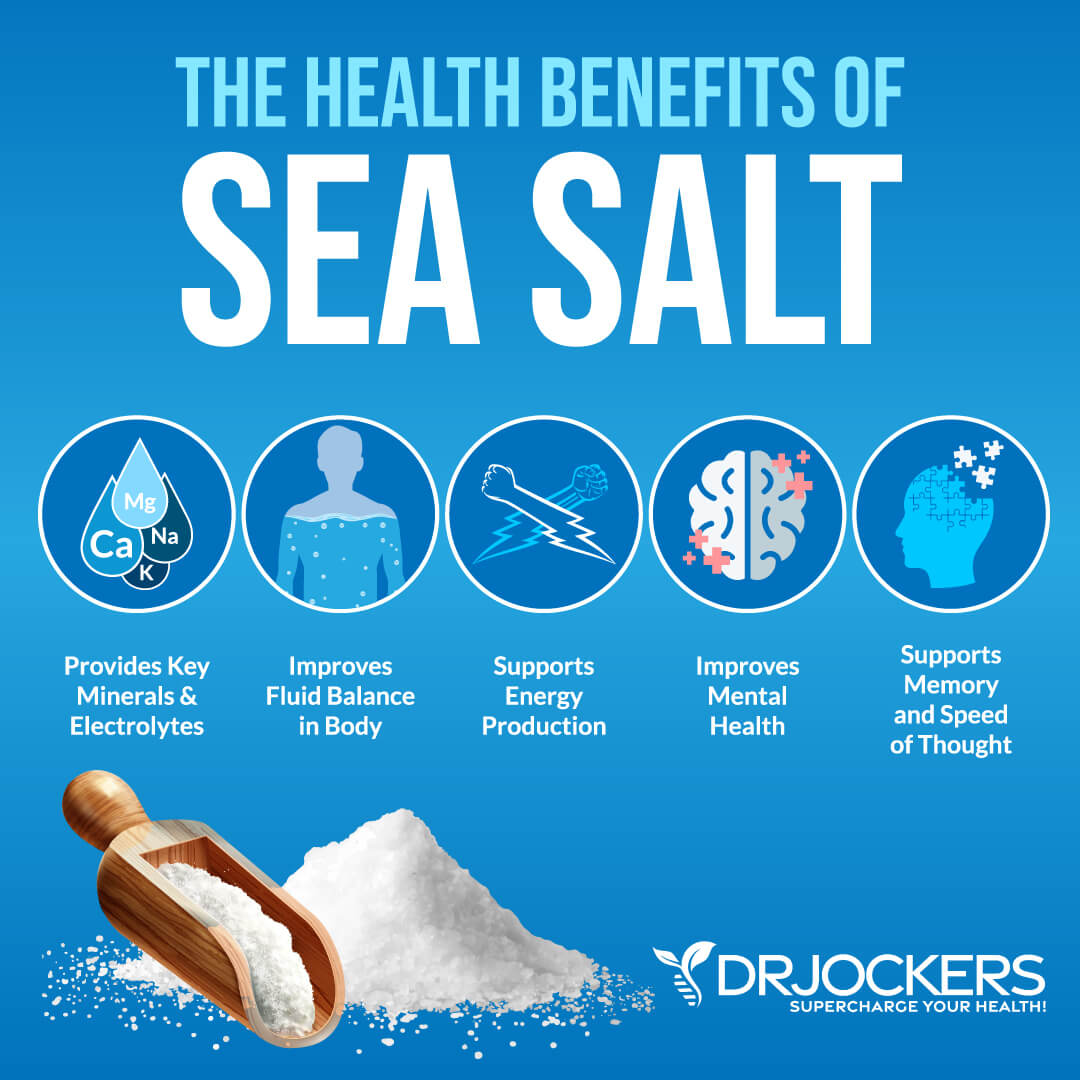
Vegetable Oil
There are two important concepts to understand when it comes to fat consumption. Having a healthy Omega-3:Omega-6 ratio is important for controlling inflammation in the body and regulating metabolism (1). Also, your brain and the myelin that surrounds your nerves is primarily made of fats.
Consuming highly processed vegetable oils contributes to disease by neglecting both of these important concepts. Vegetable oils are very high in omega-6 fats while also being highly damaged during processing. This leaves you with an elevation in inflammation and subpar building materials for your brain and peripheral nervous system!
Be careful here…these are REALLY HARD to avoid all together. Be sure to read labels and if you see anything with corn oil, soybean oil, safflower oil, cottonseed oil, canola oil and peanut oil than those are vegetable oil culprits. Many restaurants cook with these and call them “olive oil” when they are really 50% or more corn or canola oil.
Do the best you can and ask a lot of questions when you eat out. Even better, call the restaurant ahead of time and ask if you are able. My wife and I will often bring our own oils and grass fed butter or ghee to make sure we get the right stuff.
Here is an example, one of our favorite local restaurants, Ted’s Montana Grill, has a great menu with bison and guacamole and good veggies. Unfortunately, their “olive oil” is 50% canola oil…so we don’t use it. We bring our own extra virgin olive oil (we like Fresh Pressed olive oil here) or MCT oil and either grass-fed butter or grass-fed ghee.
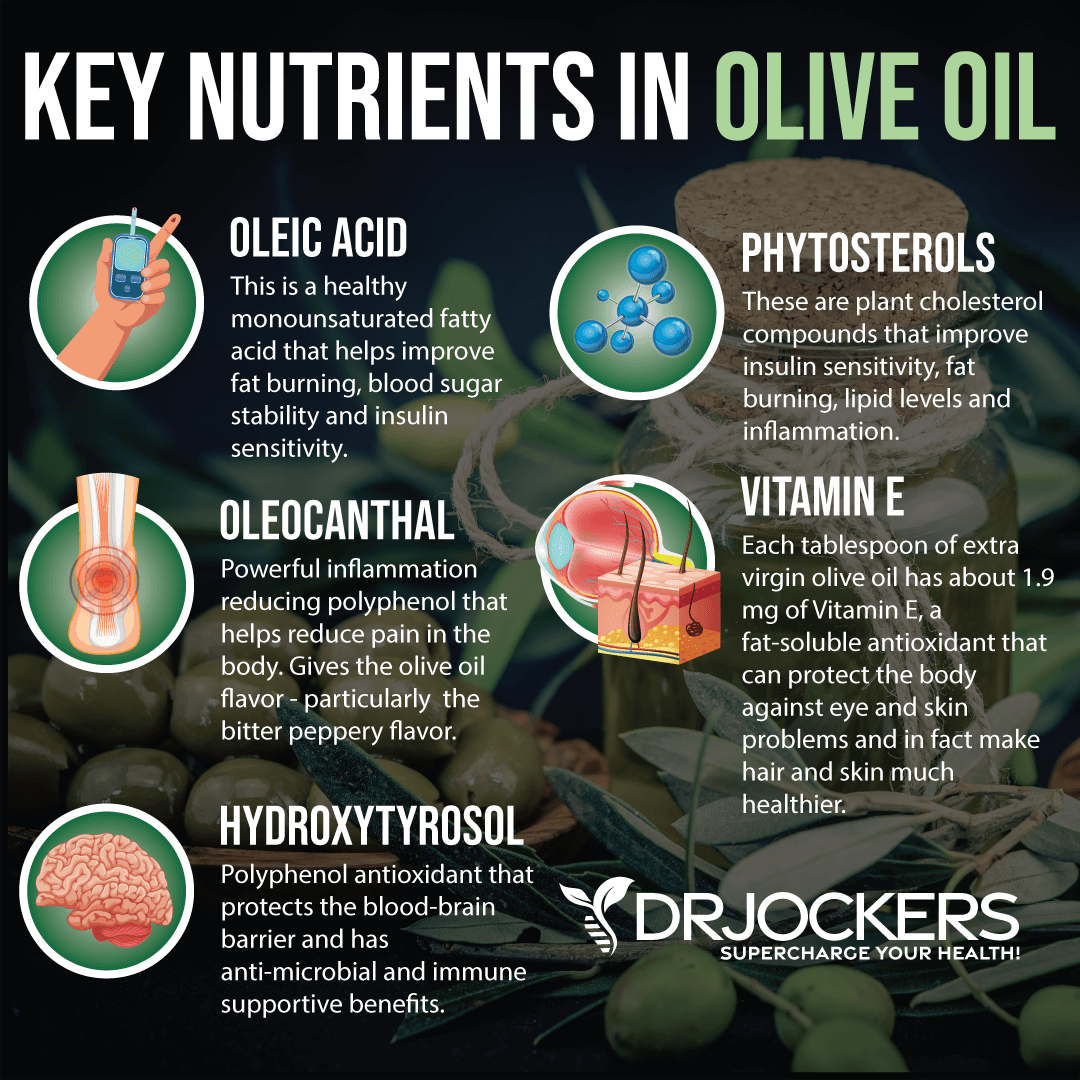
Alternative: Organic Virgin Coconut Oil
Coconut oil is a great source of healthy saturated fat that is safe for cooking up to 350 degrees F which is where it hits its smoke point. Coconut oil has a remarkable stability and along with extra virgin olive oil, butter, ghee and beef tallow handles heat quite well.
Additionally, it provides small amount of medium chain triglycerides which can be converted into ketones that have great benefits for your body. These fats also have anti-bacterial and anti-yeast properties that benefit the microbiome.
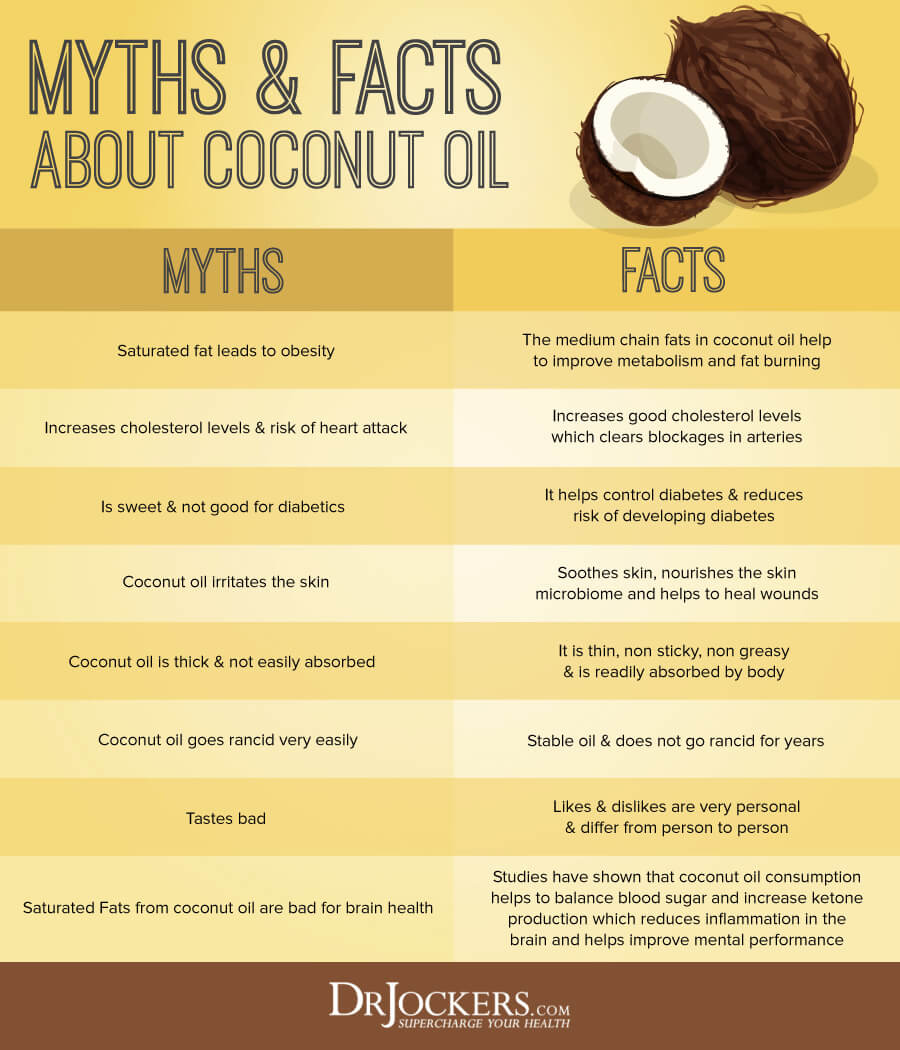
Unfermented Soy Products
Over the years, soy has become a hot topic as a healthy vs unhealthy food. My view is that you do not want this stuff in your diet. Here’s why:
- High Amounts of Phytic Acids and Lectins: Soy contains these chemicals as natural defenses from animals that try to consume them. Phytic Acid binds up minerals, lowering the nutrition you absorb from your meals. Lectins can be extremely damaging to the lining of the gut.
- GMO & Glyphosate: The vast majority of soy in our food supply is genetically modified, containing high amounts of the infamous herbicide glyphosate. Glyphosate is another compound that destroys the health of your gut while draining vital nutrients as your body tries to neutralize it.
- Hormones: Soy has mild-estrogenic effects that may be harmful to someone who already has sex hormone imbalance.
Soy products have made their way into many processed foods on the market so it is important to read your labels. Especially look out for things like “soy protein isolate” as it is a very concentrated form of soy that may have exaggerated health effects.

Alternative: Fermented Soy
Soy can be tolerable and even nutritious in its fermented form. This includes things like ORGANIC miso, natto, and tempeh. The fermentation process deactivates a large amount of the phytic acid and lectins which allows you to readily absorb the nutrients.
If you have a histamine intolerance, then I would recommend avoiding these foods as it can cause a reaction. Other Alternatives include:
- Instead of soy sauce, use Coconut Aminos
- Instead of soy protein use Gut Healing (vegan option) or Bone Broth Protein
- Instead of soy-based meats use Grass-fed Beef
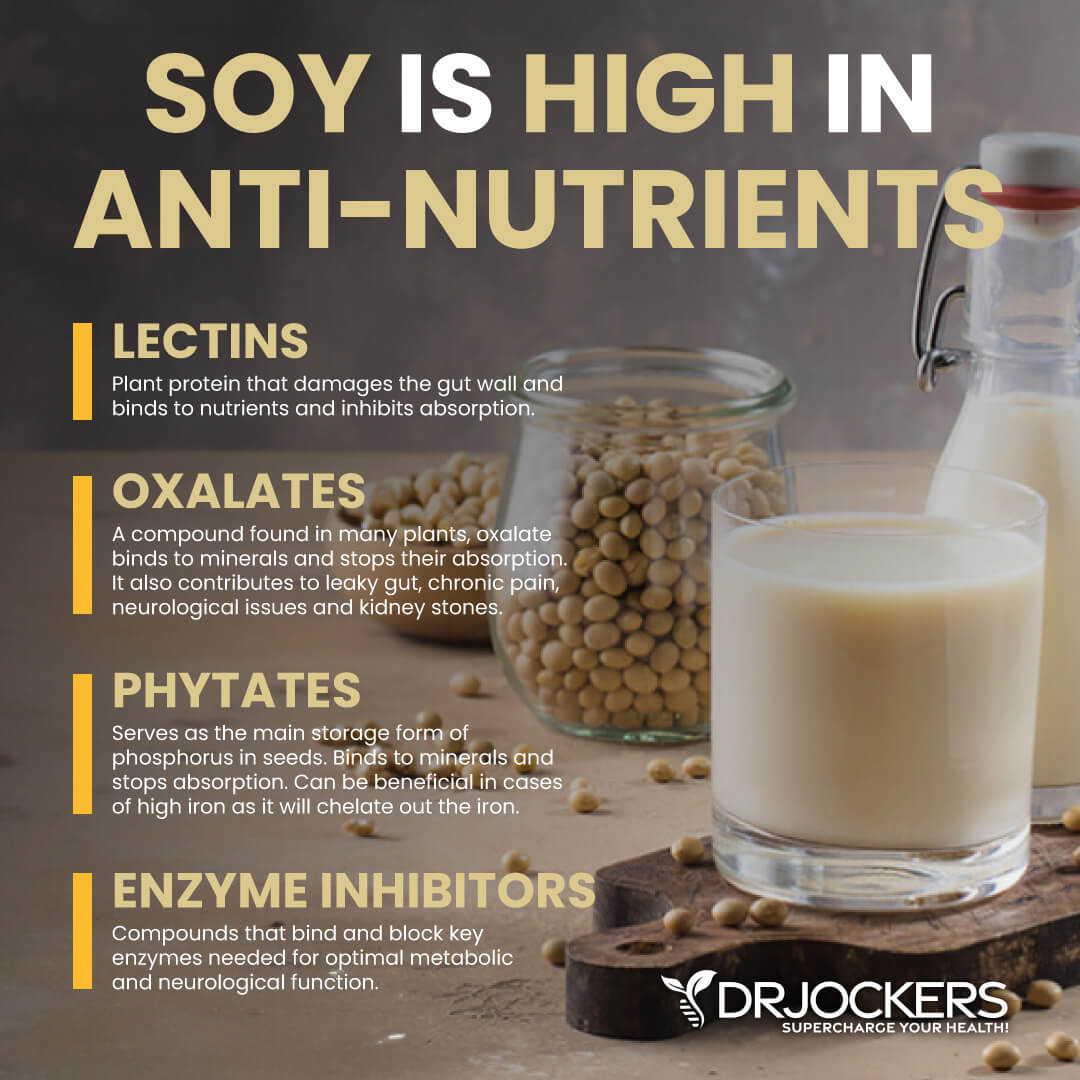
Processed Meat
The types of meat you eat are extremely important. Many people believe that simply buying the leanest meats is the healthiest option. The truth is, most of the meat produced today is simply unacceptable.
You want to avoid highly processed meats like deli meats, cured meats, and any kind of meat that comes from poor living conditions. Unless the package states that it is organic and ideally pasture-raised, you will probably want to steer clear of it.
Alternatives: Pasture-Raised/ Wild-Caught
You want your meat to come from animals that have been raised humanely, in pastures, and fed the diet they are meant to eat. For beef and lamb this would be grass, for poultry, this would be things like bugs, seeds, berries and things that can be foraged in a natural environment.
As a result these meats are more nutritious and contain a more favorable omega-3:Omega-6 ratios. The best bet to find good meat is either a health-centered grocer or an online source such as Slankers or Wild Pastures.
Microwaved Popcorn
Microwave popcorn is no good for a few reasons. First it is typically GMO corn, which will almost always contain glyphosate. Next, many brands utilize an artificial flavoring called diacetyl that is an alternative to butter. Diacetyl has been linked to respiratory disorders (2).
Finally, corn is a common food sensitivity that I see with many of my patients that can cause inflammation in the gut. Traditional microwaved popcorn is truly one of the worst foods you could possibly consume.
Alternative: Sprouted Pumpkin Seeds
If you must have popcorn, your best bet would be to either hot-air pop it or in a pot with coconut oil. Toss it up with some grass-fed butter or coconut oil and a high quality sea salt.
For an even healthier alternative, sprouted pumpkin seeds are a great option. They are super nutrient dense, a great source of zinc, and are a great source of healthy fats. They are nutrient dense and blood sugar friendly!
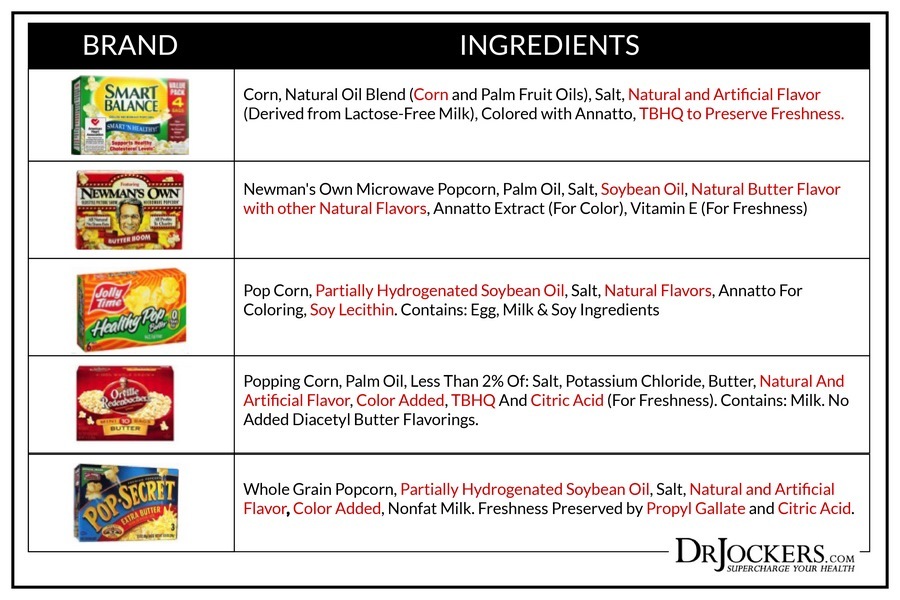
Non-Organic Produce
I have mentioned glyphosate a couple times already but I am going to reiterate. You need to avoid glyphosate, as well as all other pesticides, as much as possible.
These are toxic to the human body, leaching minerals from the body and damaging the lining of your gut. Glyphosate consumption has been linked to many forms of cancer and neurodegenerative disease conditions. It is virtually impossible to avoid exposure to these chemicals all together, but you want to do your best where choice is available to reduce your exposure to these toxins.

Alternative: Organic Produce
You can either go all organic or, if you are sticking to a budget, follow the clean 15 & dirty dozen guidelines released by the EWG. Buy organic for the dirty dozen foods while the clean 15 are relatively safe to purchase conventional.
I consider this an important investment in your nutrition and health of your gut (which tremendously influences your wellbeing overall).
Artificial Sweeteners
Artificial sweeteners and flavor enhancers include aspartame, acefultame potassium, monosodium glutamate, sucralose and many others. They allow us to make food taste amazing without needing to add salt or sugar. The downside is that these compounds have a neurotoxic effect on the brain and break down into nasty chemicals once they are digested.
The constituents of aspartame, for example, have been shown to increase chances of mood disorders, overstimulate neuronal cells in the brain, and increase chances of brain-related cancers (3, 4).

Alternative: Natural Sweeteners
One of the primary draws of artificial sweeteners is that they do not have any calories or sugar. If this is your motivation for using these products, stevia and monk fruit are great natural alternatives that will not have any negative impact on your blood sugar.
Other healthier options are organic coconut palm sugar or organic raw honey. While these will still create a rise in blood sugar, they have a relatively low glycemic index. I would recommend only using these on occasion.
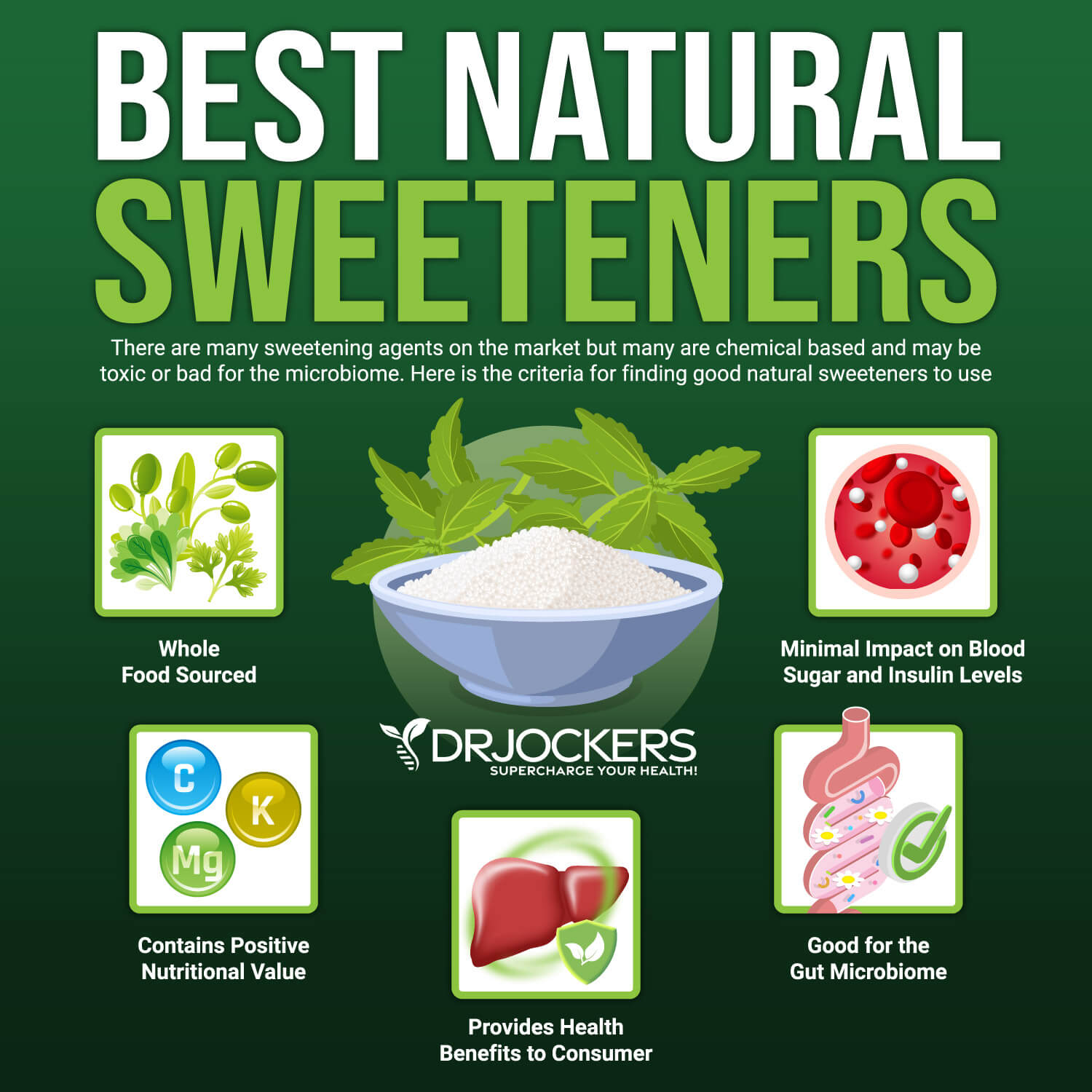
Margarine
Margarine, like artificial sweeteners, is one of the more deceptive products to ever hit grocery store shelves. It is often marketed as a heart healthy alternative to butter. This is supposedly because it contains “heart healthy” vegetable oils and does not contain any saturated fat or cholesterol.
Although marketed as healthy, margarine is actually a toxic mixture of inflammatory, GMO, oils and artificial additives that I would not recommend to anyone. You want to instead eat fats that increase your Omega-3:Omega-6 ratio while providing healthy saturated fats for brain and nervous system health. Margarine is definitely one of the worst foods you can consume!
Alternative: Grass-fed Butter
While many alternatives could fall here, in terms of the health effects mentioned above, butter provides a very complete nutrition profile. Butter from grass-fed cows is naturally high in Omega-3 fatty acids as well as important saturated fats and dietary cholesterol that are key for brain health and formation of sex hormones.
Other great options include: Organic Coconut Oil, Extra Virgin Olive Oil, Animal Fats (Lard/Tallow), Omega-3 rich fish, and avocado oil. As a general rule, fats that are solid at room temperature are suitable for cooking, while those that are liquid at room temperature are better suited as dressings after cooking.
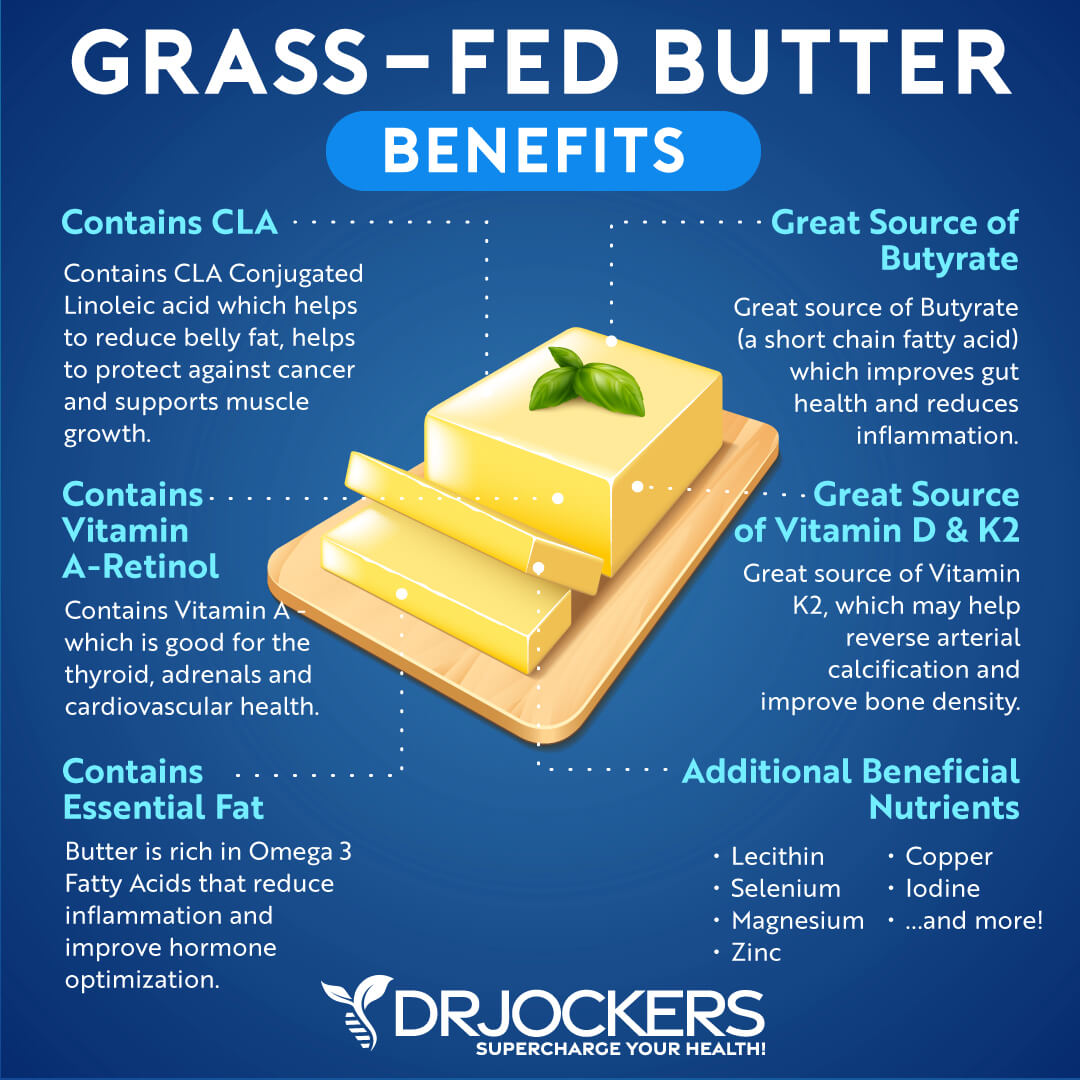
Canned Tomatoes
Chemicals from plastics are a disaster to healthy hormone balance. For men and women, frequent exposure to chemicals leached from plastics can cause an elevation in estrogen that has many negative health effects. One of the major offenders is the chemical Bisphenol-A (BPA).
What many people don’t realize is that BPA is often used in canned goods to protect the inside of the can from deteriorating. Combining a BPA lining with an acidic food such as tomatoes causes large amounts of BPA to leach out of the can. This means consuming canned tomatoes exposes your body to a massive amount of BPA.
In addition, aluminum cans also contain aluminum which leaches out with acidic substances like the canned tomatoes. Aluminum is highly toxic and especially detrimental to brain health. Although many have thought that canned tomatoes are a healthy choice, they are definitely one of the worst foods you can consume.
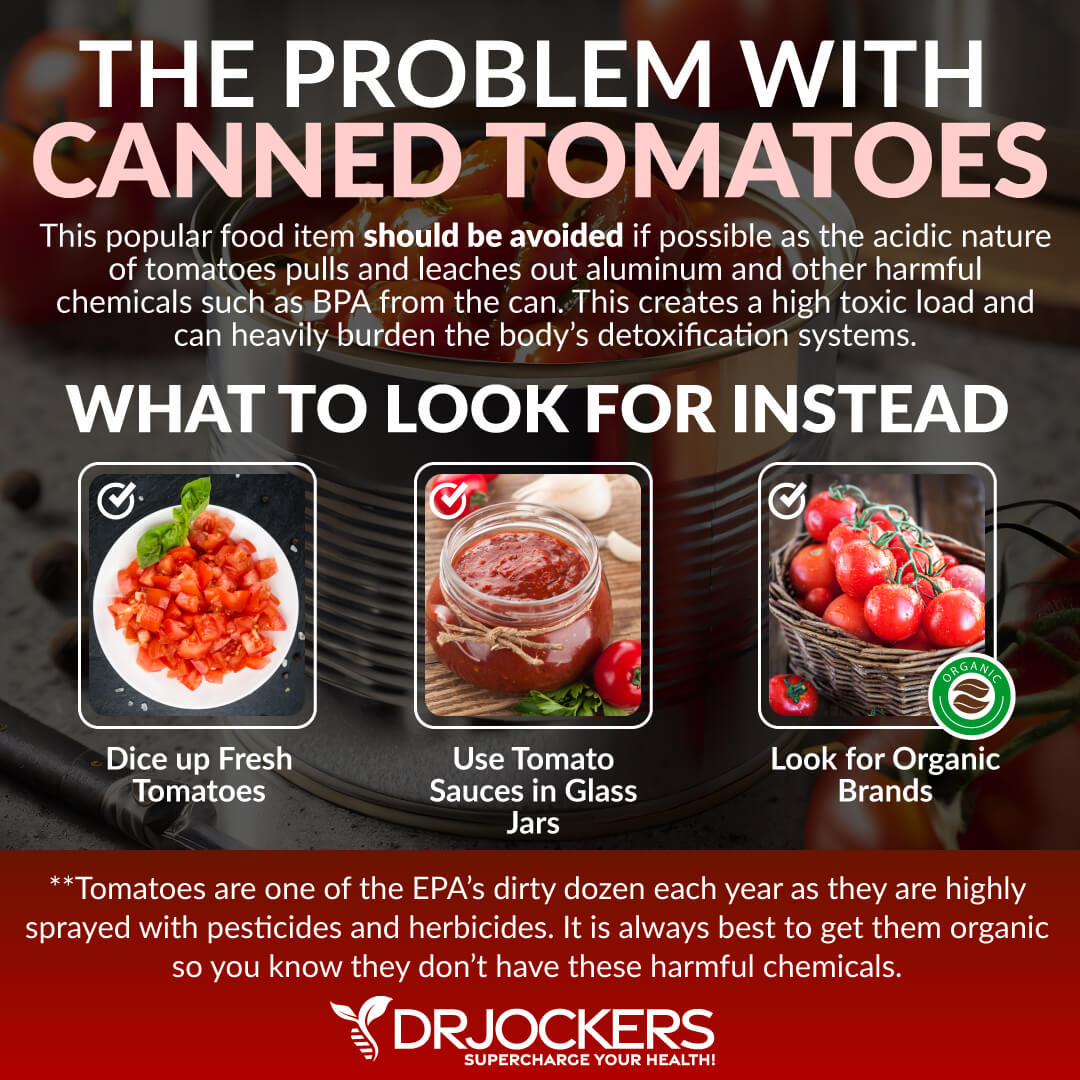
Alternative: Fresh Tomatoes
You may be able to find canned tomatoes in BPA free cans or even alternative packaging. However, I would say it is probably ideal to buy fresh organic tomatoes from your local health foods store or farmers market.
You can also get tomato sauces and diced tomatoes in glass jars and this is perfectly acceptable as the glass dosn’t have chemicals that leach into the tomatoes. Many brands offer tomatoes and tomato sauces in glass jars these days.
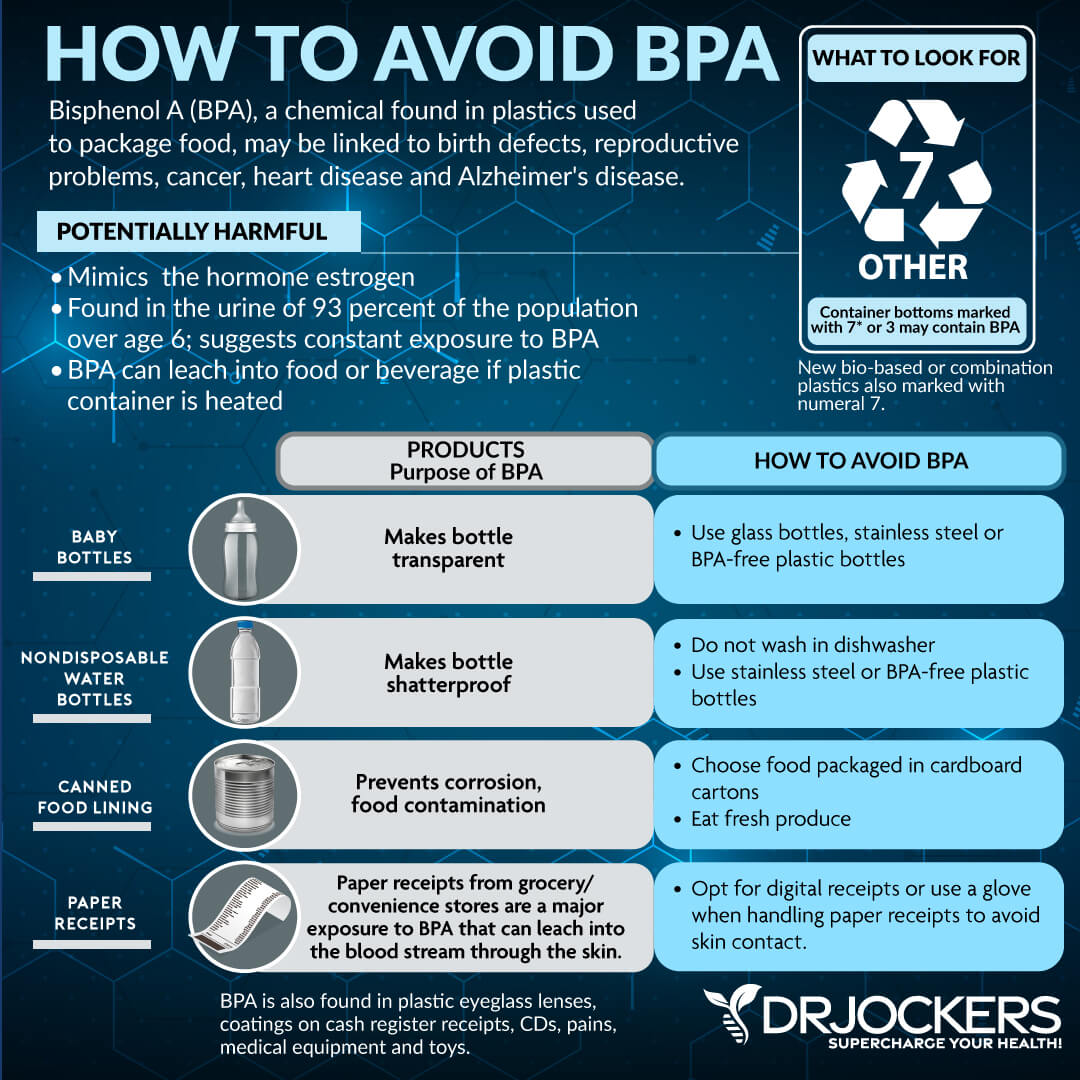
Following A Healing Diet
Sometimes the most daunting thing about beginning a new way of eating is becoming fixated on all of the worst foods you can no longer eat. So, after you get a general idea of the most important worst foods to avoid, it’s best to focus on these key guidelines for the foods you should eat.
A healing diet focuses on a style of eating that stabilizes blood sugar, dramatically lowers inflammation, reduces exposure to environmental toxins, and floods the body with nutrition on a daily basis. As a simple starting point, I recommend 3 key rules for a healing diet.
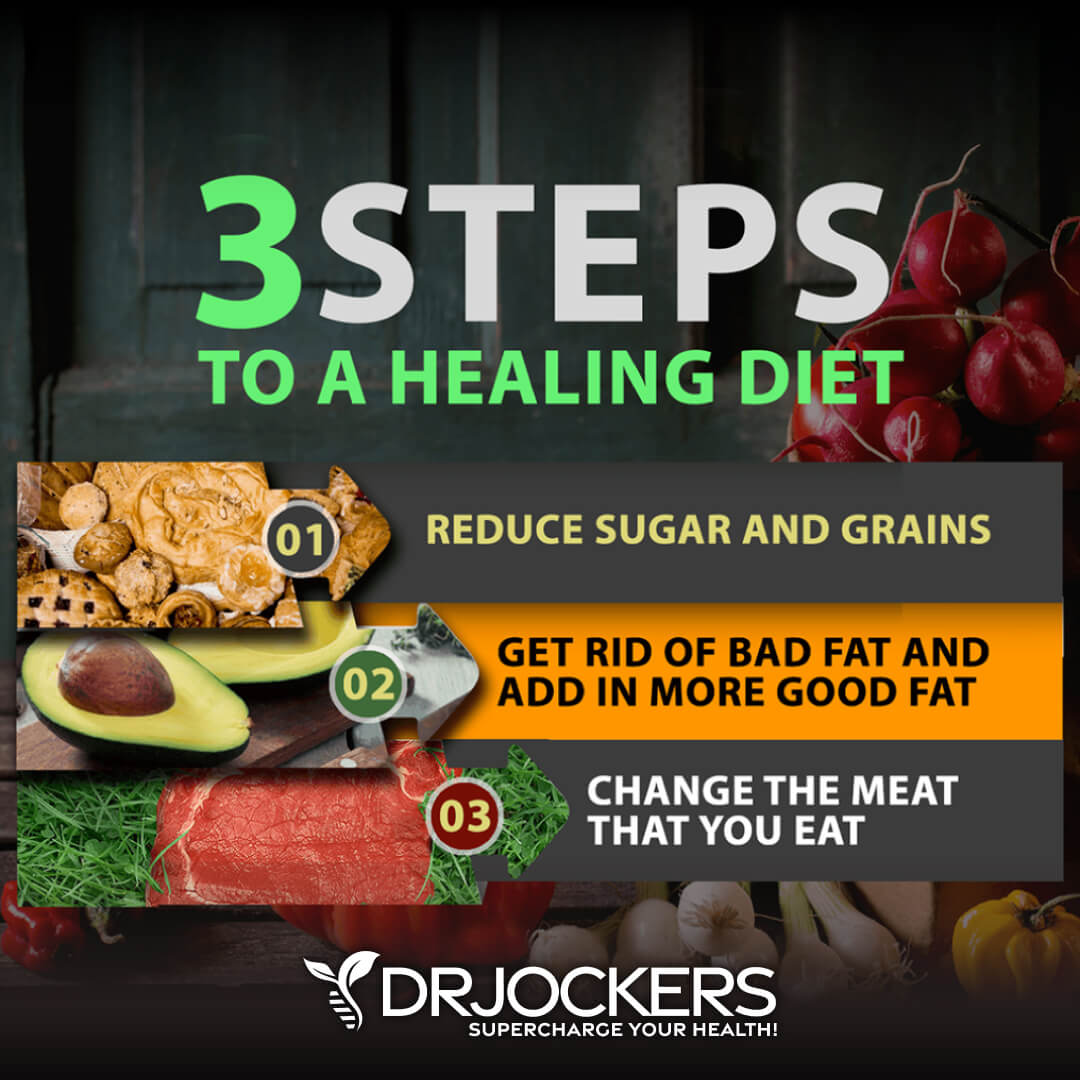
Reduce Sugar & Grains
Sugars and refined carbohydrates consumed frequently throughout the day send blood sugar into an unstable rollercoaster. Along with this comes a fluctuation in insulin levels that contributes to inflammation, weight gain, and unstable energy levels.
Additionally, removing grains will drastically reduce phytic acids and lectins going into your system. This will help you extract more nutrition from your food and put less of an inflammatory strain on your gut lining.
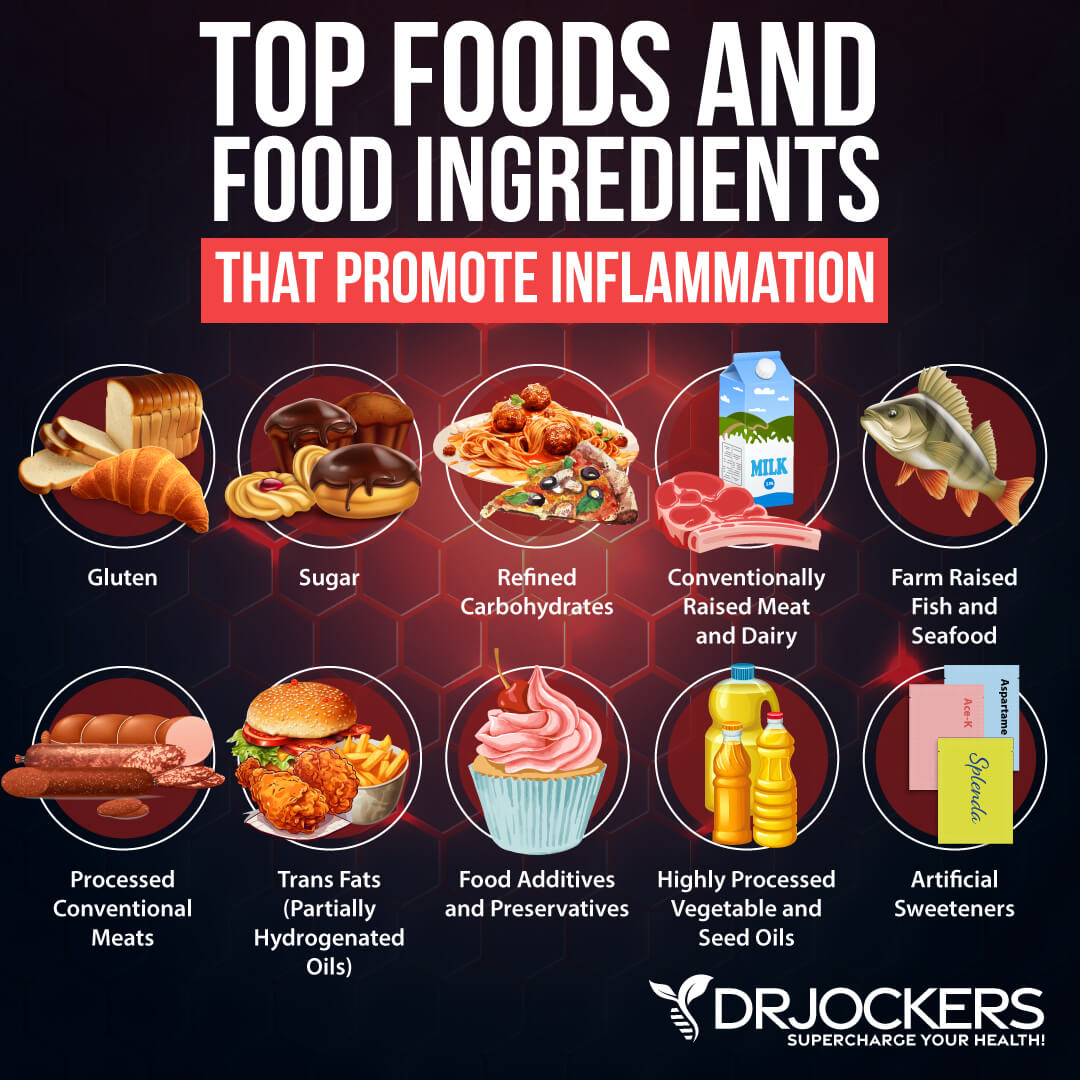
Decrease Bad Fat & Increase Good Fat
Remove highly processed oils and fats from conventionally raised animals. Replace them with healthy fats.
This includes things like grass-fed butter, coconut oil and coconut products, olive oil, avocados, and MCT oil. These help stabilize blood sugar, balance hormones, and keep you full between meals.
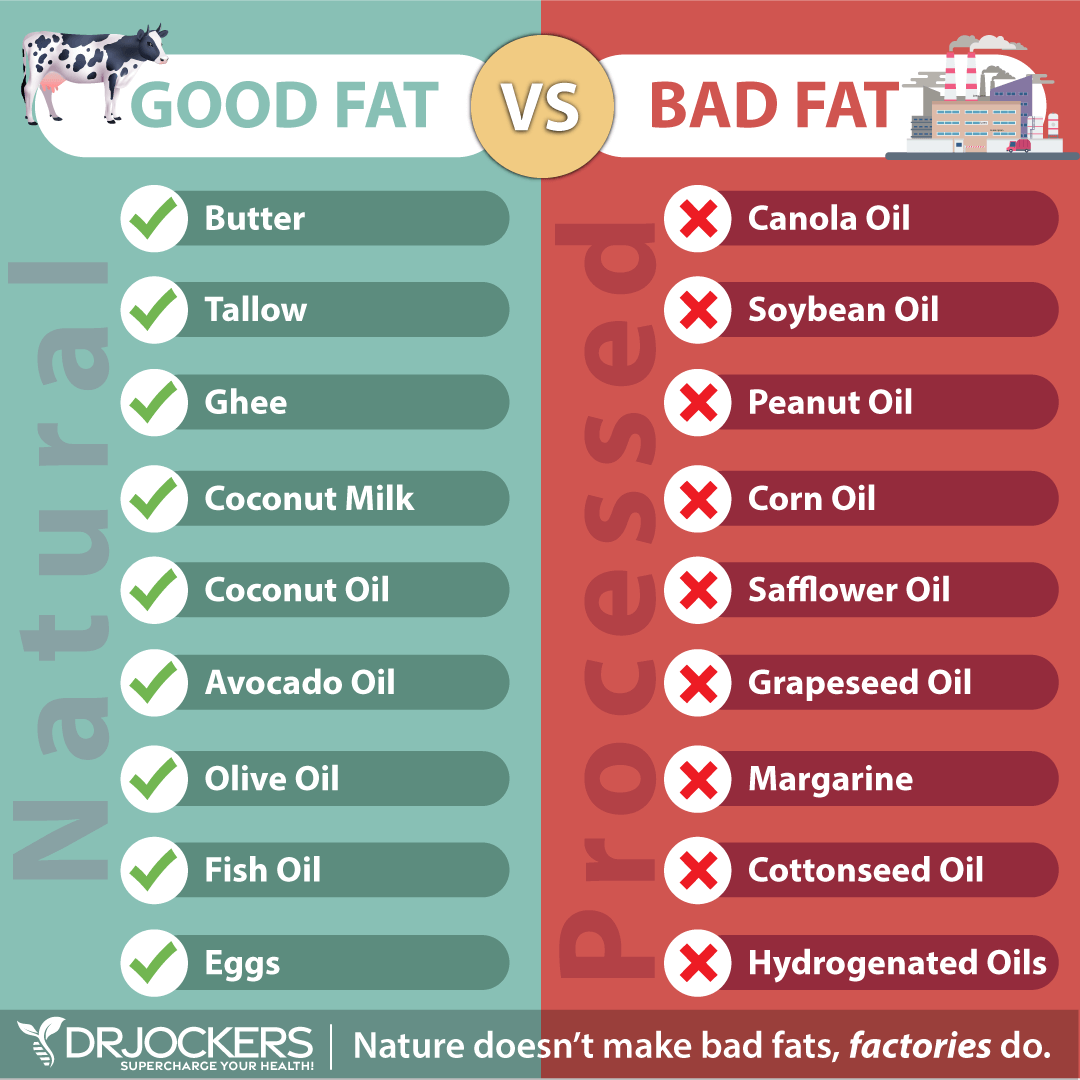
Change The Meat You Eat
It is absolutely critical that you replace all conventionally raised animal products with those derived from pasture-raised animals. The nutritional value of any animal derived product is a direct reflection of the environment it was raised in. Meat and dairy from pasture-raised animals is richer in nutrients, contains more omega-3 fatty acids, and overall is better for you and the environment.
Now you understand the worst foods to eat so be sure to avoid these. For a more in-depth shopping guide, click the banner below and you can get a free shopping list for the healing diet along with core principals of this powerful eating style.
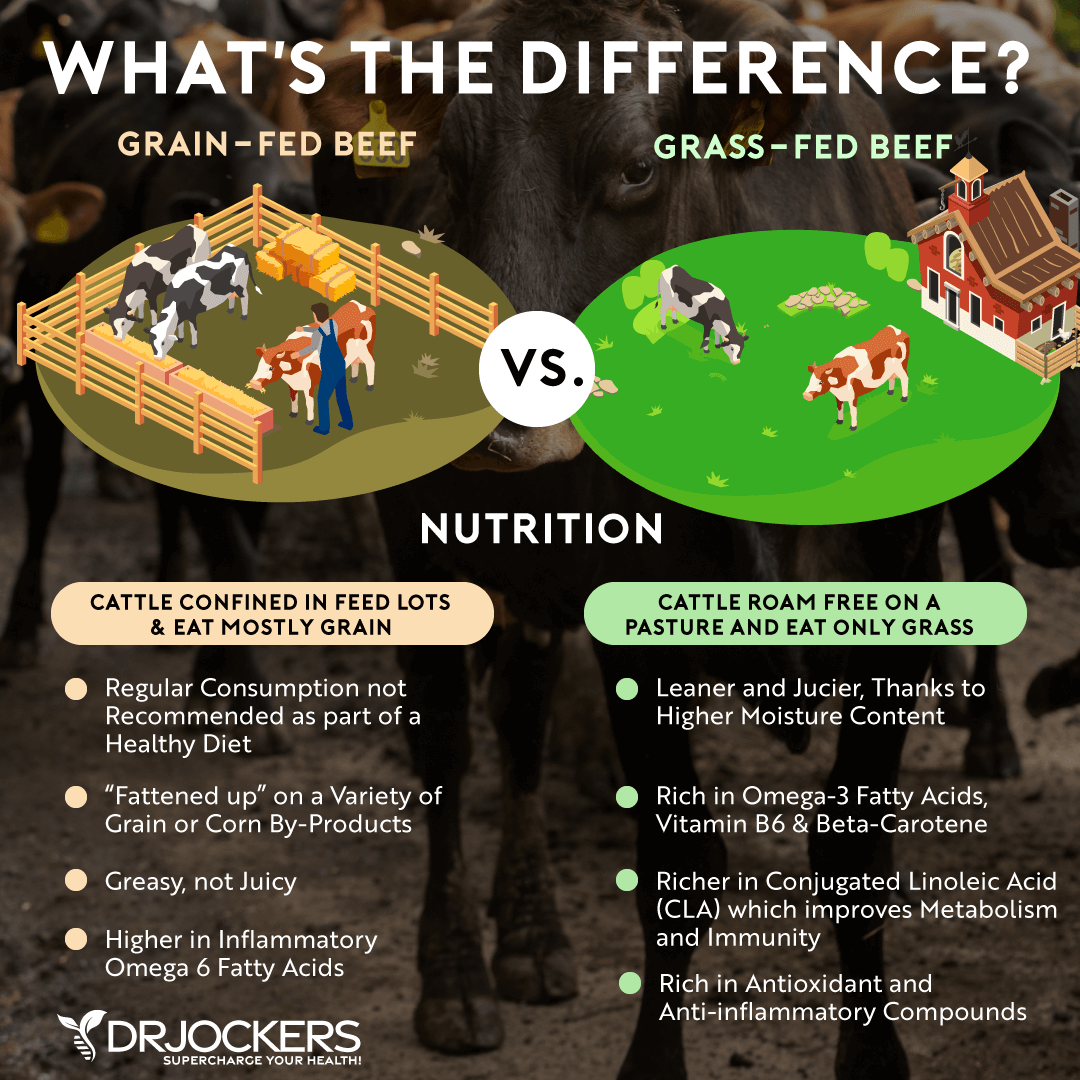
My Favorite Olive Oil
My favorite olive oil is this Fresh-Pressed Olive Oil. It is the most flavorful artisan olive oil you can find out there. It comes from award-winning artisan farms with a harvest-fresh taste to your table. These oils are independently lab-certified to be 100 percent extra virgin olive oil — so you can trust the quality. My family swears by it. We use it daily on our salads and meals. Our kids love it. I am sure your family will too.
I am excited to share a special offer with you. You can get this $39.00 bottle of Fresh-Pressed Olive Oil for only $1.00 to help with shipping if you click on the link here
Inflammation Crushing Ebundle
The Inflammation Crushing Ebundle is designed to help you improve your brain, liver, immune system and discover the healing strategies, foods and recipes to burn fat, reduce inflammation and Thrive in Life!
As a doctor of natural medicine, I have spent the past 20 years studying the best healing strategies and worked with hundreds of coaching clients, helping them overcome chronic health conditions and optimize their overall health.
In our Inflammation Crushing Ebundle, I have put together my very best strategies to reduce inflammation and optimize your healing potential. Take a look at what you will get inside these valuable guides below!
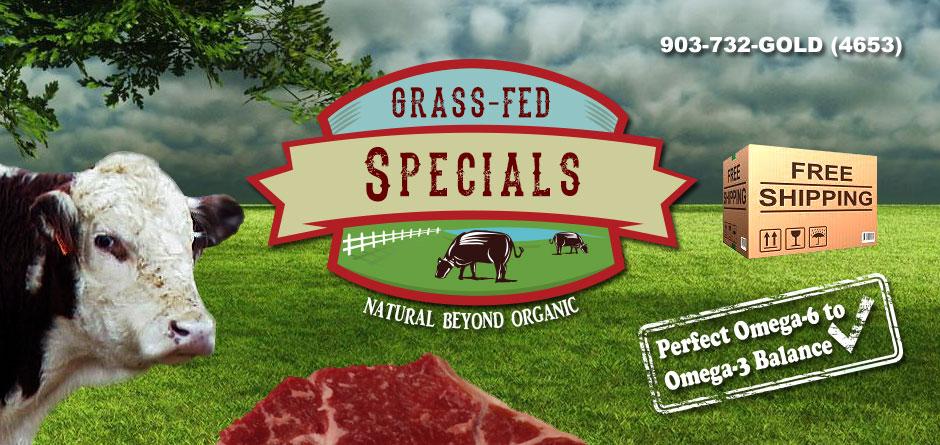
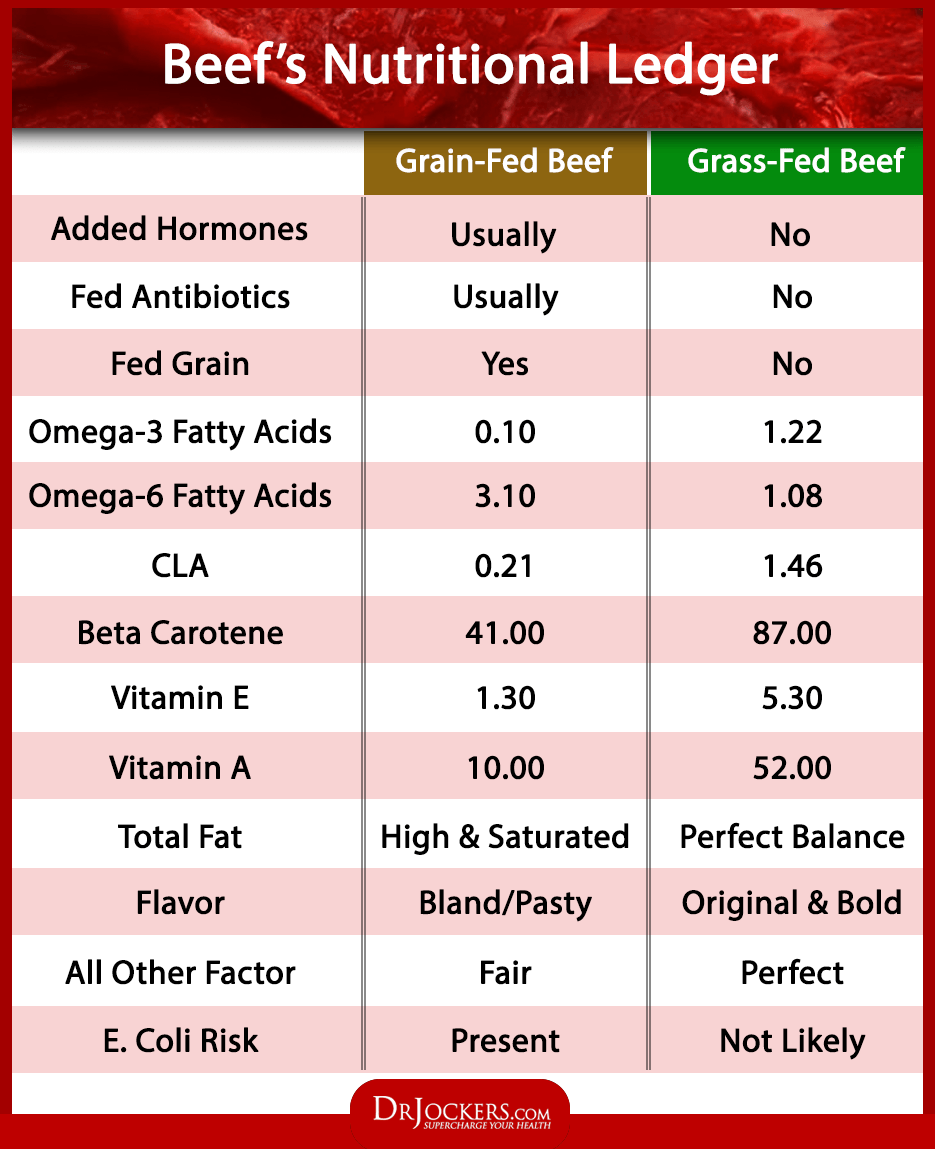
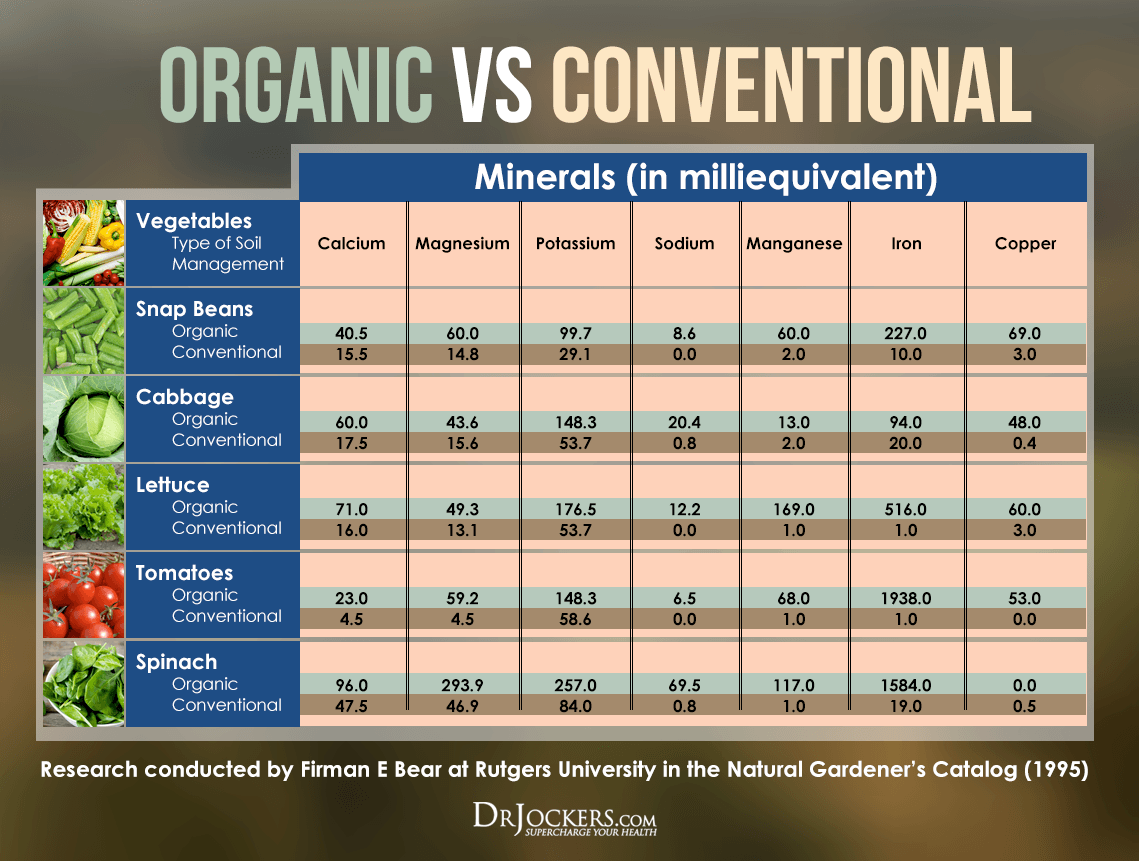
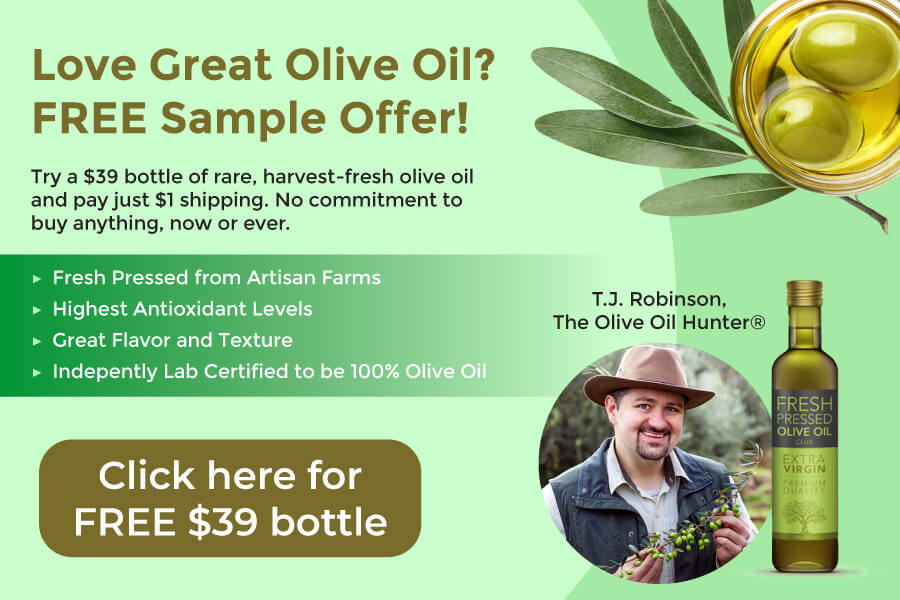




Thank you for the interesting article. Can you please tell me the source for your table, Beef’s Nutritional Ledger? I would like to read more on this subject. Thank you.
These nutritional values can vary because each animal is raised in slightly different environments but here are some nice articles that explain this subject:
https://www.ncbi.nlm.nih.gov/pmc/articles/PMC2846864/
https://www.cambridge.org/core/journals/british-journal-of-nutrition/article/composition-differences-between-organic-and-conventional-meat-a-systematic-literature-review-and-metaanalysis/B333BC0DD4B23193DDFA2273649AE0EE
Question, regarding avocados. When you buy avocados you cannot open them in the store, and therefore cant tell sometimes wether it is good…if a avocado is brown like spots or if the majority is brown, does that mean its bad or are they still good to use and eat. Should it be all green to eat or ?
I live avocados but i have a hard time storing them to keep them fresh.
Also ive heard of oil pulling which is healthy for teeth and immunity, what will happen if you accidently swallow any…and is it ok to just eat a tsp/tbsp of coconut oil?
Hey Kim avocados should have a slight give to them when you squeeze them, that is an indication they are ready to eat. They can bestowed in the refrigerator if they begin to feel like they are getting too soft. This is something you just need to get a feel for over time and you will notice that sweet spot! You want the inside to be preferably nice and green on the inside with as little brown as possible as this is a sign of oxidation.
As for oil pulling you will want to avoid swallowing as it accumulates many toxins during the process that should not be ingested.
Thank you so much for your interesting article. I am a newbie at a healthier lifestyle. This really helped me be aware of many choices to make on this journey.
Glad to hear that!
Avocados should not be soft when purchased. Allow them to ripen, only until they yield slightly to pressure when slightly squeezed. If you buy many at a time, put some of them in the frig so they will take longer to ripen. Also, if you pull off the little piece left from the stem, it should be green underneath. If it’s brown, then it’s likely that the avocado is also brown in places.
Oh, and it’s preferable to spit out the oil after pulling due to the impurities you just pulled out, but it isn’t harmful if you accidentally swallow it.
Happy eating!
Thanks for your input TL!
Have heard the oil from oil pulling contain toxic, so not recommend swallowing. As have mentioned above by Dr. Jockers…
It’s the toxins from your mouth released by the oil.
Unripe Avocados do not do well under refrigeration, they’ll turn an ugly black inside. Let them ripen at room temperature. Once ripe you can store in frig or freeze
Thanks for sharing the advice Renie!
Hi Renie- I buy avocados by the bag, so was having trouble of having them all unripe at the same time, then too many ripe at once, and then too many spoiling because I could not consume them fast enough. After seeing a friend do it, I recently started refrigerating the unripe avocados, and taking out of the fridge only a couple at a time-and allow them to ripen in small numbers. I have yet to see one turn black inside, maybe I have been lucky, but the system has taken the pressure of getting the correct timing for consumption.
Great information! However, I looked up both the Herbamare & Bragg’s Sea Kelp Delight & neither list iodine on the label; not sure how it supplies it if it’s not listed on the nutrient list.
Both of these seasonings contain sea kelp which is a natural source of iodine.
👍
I appreciate this article so much thank you. I was pleasantly surprised that I had eliminated all of the bad stuff already and am well invested in the good. I live in Chiang Mai, Thailand where many of the issues raised stare us in the face daily and I have learned there are some things I require ordering from the USA from companies like Iherb and Vitacost who deliver my natural product goodies to my door. Also, we import Himalayan Pink Salt directly in full containers from Pakistan to provide for the international and Thai community here and I have been drinking sole’ ( pink salt with water) for 13 years daily now and feel the energy from all of the minerals I absorb. My blood pressure was 110 over 67 last week so I know the salt is not negatively affecting that aspect of my health. My question is, can I be using too much of this precious salt?
Great to hear you are on the right track John! It sounds like you are not experiencing any negative effects from your salt intake so I’d say you are okay to keep it up! Here is a great article on salt that may help you with this: https://drjockers.com/is-your-salt-killing-you/
A large study was completed in Australia on pink salt last year and the results showed very high toxicity (especially heavy metals) in all pink salt that was tested. I would recommend switching to Celtic
Sea salt for minerals and electrolytes instead.
Thanks for sharing!
Hmm, I’m pretty sure that glyphosate (Roundup) is an herbicide, not a pesticide. Both are harmful, but a herbicide is even worse!
Thanks for the input TL! It has been updated but you’re right, neither should be part of a healthy diet!
Weeds, insects, fungus, are all pests. Therefore, herbicides and fungicides are pesticides. If you want to get rid of an insect use an insecticide, if you want to get rid of a mite use a miticide.
Thank you for your newsletters, recipes and summits! I find them very encouraging.
I have many health issues (MS, Lymes, Celiac) and have been eating KETO for a year.
It’s made a big difference. Just wanted to thank you.
Thank you for sharing Sandra, that is awesome!
Keto is not as healthy as plant based eating .
The entire food system is plant based.
Thank you so much for this fantastically clear and useful article.
I have a question regarding salt. What about Himalayan salt? And how do we recognize it is genuine?
I live in the beautiful but small and densely populated island of Mauritius where unfortunately many products are imported and thus quite expensive. Any idea on how to replace animal protein in the diet? I have to stick to a strict budget.
Thank you!
Fab, article! So informative, thank you 🙂
I have been eating low carb/high fat for about a year after coming accross one of your articles and I feel great as a result. I live in Scotland so have the luxury of reasy access to good quality, grass-fed, clean and ethical animal products.
Could you please comment on soaking nuts and seeds.
I loved your article… trying to do all of it.
Hey Ina, Soaking methods are a great way to reduce lectins but it doesn’t fully eliminate them. I actually go into more detail about soaking and sprouting them in this article: https://drjockers.com/avoid-lectins-diet/
? kinda conflicting was curious how GMOs/whole grains not in the top 9 BUT then below #1 is to drop sugars and grains on the list of 3 ? Honestly GMO corn soy and Wheat are 10X more consumed then most list of 9, table salt and tomato sauce ? how about just anything BPA lined cans and usually its canned soups etc loaded with bad salt also. Just saying the list is way to specific and very limited in scope. Top of list should be GMO NON-Organic Corn Soy Wheat which covers the worst of the worst and the 3 largest mass produced over consumed crops in the country including all the derivatives corn syrup (most sugar drinks) corn oil soy oil (most salad dressings) soy proteins etc etc, Wheat is half the cereals and most the bread isle pasta etc etc this is half the diet of some people. The most recent data on GMOs and Glyphosate loaded corn and whole grains is this is most Likely the biggest gut issue even less then problems with gluten, so GMOs are probably the single biggest factor in creating leaky gut and Auto Immune issues that you cover pretty extensively SO why Im making this a point not to mention the ant-biotic nature of glyphosate destroying gut bacteria.
Just being constructive personally think your info is on point most of the time compared to others! Side note liked your interview covering Keto and cancer was aware of this and the glutamate connection but not your guest. Something you might want to research is the GABA/Glutamate cycle how it effects mood depression mental health nervous system and specifically supplements like taurine that are glutamate blockers. I think this is being overlooked in the research, ever hear of the cancer patients that just get acting positive and the cancer goes away because your mood and mental state effect the cycle and how GABA/Glutamate or utilized. Also Glutamate effects similar brain function as drugs creating a dependency, “NAC” helps break these addiction cycles+ also. Not sure how the nervous system effects Mitochondria function but it may be effected by the Glutamate cycle creating the over stimulation that helps fuel cancer??? Increased GABA and Glutimate blocking supplements may be a key factor.
Thanks for sharing Mike! Yes that is true about the GMO corn/soy and wheat! Here is a helpful article on GABA https://drjockers.com/gaba/
Thanks so much for all the information. I have learned so much through your articles and podcast. So happy that I found your site.
Thank you Suzanne for the kind words! Blessings!
Do you suppose we’re overdue to have health warnings on diet soda products that contain aspartame? As in – This product is known to cause optic nerve degeneration. When I worked as a medical transcriptionist for seven family practice and internal medicine doctors, I had to be able to type like really fast! I used to consume several diet sodas in a day, not knowing that was causing my severe blurred vision. When I learned about the toxic effects aspartame had on vision, I quit that stuff immediately and lo and behold – my vision returned! This is wicked bad stuff and should not be on the market! If my memory serves me correctly, I believe it was Donald Rumsfeld who applied political and FDA pressure to get this poison in the market. Just because something is FDA approved does not necessarily mean it’s actually safe for human consumption – although I suppose it is if no one is dropping dead immediately! Thanks for getting that information out there.
there is a good lady who contacted the fda writing: if aspartame is so bad why don’t you ban it? after several years of writing, they finally replied: we need to reduce the population!..pretty wicked, isn’t it!
Hi Cheryl, I am sorry to hear that this happened and I’m happy to hear you quit the habit and your vision returned! Thank you for sharing!
Dr. Jockers I appreciate all the information you share. I have purchased some of your products and listened to speakers from the Summit. However, I still am not confident in all that I am doing.
For the past few weeks I have done the following and would appreciate your advice on what I’m doing wrong or right: first thing every morning I drink 1 glass of water when I wake, than a glass of water with a teaspoon of Himalayan salt water after barn chores and a cup of water with 1/2 lemon and a tablespoon of 100% extra virgin olive oil. At work in the morning I will have a blueberry/ginger tea with MCT oil. I fast from 3:00 pm until 12:00 the next day. I eat form 12 to 3 and have a coffee with MCT oil and cream. I try to eat keto for lunch using recipes from your book. I have no health issues but need to get 8 hours sleep in-order to make it through my day. I still work out and am 70 years old. I do not do the above on Thursdays because I go to a friends for lunch and eat whatever she is offering. I will often not eat keto for supper. Any advise to improve what I’m doing would be appreciated. My husband is not well so I have extra things to do on the farm so I get lots of exercise.
Hey Linda, I don’t think you would need the olive oil in your water and lemon drink. Sounds like you have a great eating window and lifestyle. I am not sure if you are exercising, but that would be very good as well. Blessings!
First of all Thank You for this excellent article. My family follows these principles and yes it is more expensive. So we made some changes. No more cable or satellite TV, we stream instead and that saved $160/mo. We also became very focused with our car usage saving gas and maintenance and mileage (and reducing emmissions) We also started grocery shopping online with free delivery so we can buy the grass fed and fresh organic products as we need them. We do not miss driving to the grocery store at all.
Our city tap water is highly chlorinated so we invested in the top rated countertop water filter giving us beautiful clean water for cooking and drinking.
Our feeling is It is a lot cheaper to buy grass fed, fresh and organic than to spend huge amounts of money fighting preventable illness.
Hi Gillie!
Funny thing, as I did the same! I’ve always said if there’s a will there’s a way! TV to me should have a black box warning, detrimental to your health, lol 😂.
We have a wonderful company where I live called The Green Bean, that delivers fantastic organic fruits, veggies, cheese, eggs and dairy along with grass fed and finished meats and poultry. I use distilled water and my Big Berkeys for clean water and add organic minerals back to them.
Good to know there are others out there who have done the same. In fact I don’t even carry health insurance as I don’t need it, nor would I use it. Saves me a ton of money!
Any tests or blood work can be ordered and paid for in cash, no need for the allopathic sick care. Heck, I don’t even have an aspirin in my house, lol 😂.
I believe God gave us everything we need to live happy healthy lives, we just need to use it.
Praise the Lord! Thanks for sharing!
Dr Jockers, or anybody that would care to chime in: I used to frequently eat wild caught salmon from Alaska. I don’t trust eating it anymore, because I keep hearing periodically that the West Coast of the US is being “fried” with radioactivity from the Fukushima reactor meltdown. Just wondering if there’s any truth to that, and if the salmon has any radioactive stuff in it.
I still recommend wild caught Alaskan salmon as it contains a high amount of long-chain fatty acids – EPA/DHA and astaxanthin because these fish eat a lot of red algae. The astaxanthin naturally reduces radiation so these are low in radiation and very healthy.
Thank you Dr. Jockers for the good information you provide. I am 94 years old and take no medication. I have learned that some of the things I thought I was doing right needed to be improved on. I have moved to Alabama and miss coming to your office. Thank you for helping me live to this age.
Great to hear that Margaret and blessings to you!
Good article. Big question is about sugar substitutes. You mention Stevia (which I have been using for years) which I grow. Because some are allergic to it (it is a cone-flower), I have been using organic erythritol and organic xylitol made from birch trees. Unfortunately, most xylitol is made from corn and who knows if it is really non-GMO) FYI coconut palm syrup has about half the carbs as honey (although not as healthy) Your thoughts?
Great to know Linda! Thanks for sharing!
As usual, your article contains so much helpful and highly researched information. THANK YOU for your dedication to natural health and for providing it to us for free! Health and happiness to you and your family…thanks again!
Thank you for all your support Donna! Blessings to you and your family!
Wonderful and informative article Dr Jockers. I am now very disappointed to hear soy milk is not healthy. I drink organic non gmo Silk brand soy milk 2 to 3 times week to help with my hormones. I will have to eat tempah instead. Is organic tofu ok? Thank you for your information
Yes we do not recommend soy milk. Flax milk would be a better choice there.
What about almond milk?
You can use almond milk, that is an acceptable milk alternative: https://drjockers.com/top-5-milk-alternatives-to-use-and-3-to-avoid/
Would you please tell what fruit / veg the clean 15 and dirty dozen are. I clicked on the link and it’s not working. I’m very interested and want to follow it. Thank you Dr. Jockers for all the excellent information.
Here are the 2021 Dirty Dozen:
Strawberries
Spinach
Kale/Collard/Mustard greens
Nectarines
Apples
Grapes
Cherries
Peaches
Pears
Bell and hot peppers
Celery
Tomatoes
Here are the items on the Clean 15:
Avocados
Sweet Corn
Pineapples
Onions
Papayas
Frozen sweet peas
Eggplant
Asparagus
Broccoli
Cabbage
Kiwifruit
Cauliflower
Mushrooms
Honeydew
Cantaloupe
Hello Dr. Jockers, So Dirty Dozen we should not eat, and Clean Dozen we should, I’m from Maine, and we don’t have a lot of foods here like you mention,coconut milk, grass fed butter, etc , what else can I use instead, I would like to know!, how about Haddock and Salmon fish!
Thank you 🙂 Have a blessed day.✝️
Thank you! Blessings!
Hi..the problem for me is that your suggestions are way out of my budget☹️I am already spending a small fortune on food without eating organic or grass fed meat…besides the fact I don’t have the energy to shop around for the items you suggest. Keep in mind, pls, that many of us are not millionaires.
Yes, it is so important that we all look to prioritize our health and find ways to afford healthy food choices!
Thank you for your articles and caring for other’s health.
Can you comment on organic agave as a sweetener? I am curious if the comercialization of it has produced a high fructose version that is as bad as corn.
Also it is mostly sold in plastic bottles. As it is prodoced, i imagine it is bottled hot, which will leach the plastic.
Thank you!
I like your nutritional articles. However I’m having a huge issue still on being convinced that putting coconut oil or using it is the best for everyone including using recipes with content of coconut oil or milk. I tied the keto diet a few years back. I don’t know that I overdid the oil thing or not. But I put on weight fat! And I am normally lean. Most of my life I have worked out and physically in good shape. This was a huge issue for me. Having a lean body mass and abs. And seeing the fat that came on bothered me and it’s been hard to get back off. I came to know in research that some people don’t digest fat or oils well,, this can be areal problem for people such as myself. And it showed up on my health charts. And I was not eating a high fat meat diet just added the coconut oil to recipes cooking and the coconut milk to recipes like the ones you put on your site. So I’m discouraged on the constant promotion to coconut and keto anything and what it might be doing to others similar to me.
Who can afford “good” foods anymore. Certainly not the folks in the lower classes. Even middle class people can’t afford food, gas, etc. Everything labeled “organic” is twice as high. These other foods might be poison or no good, but they keep the belly full. I know of no family who can afford these “better” foods. Saying something is “organic” is akin to saying it’s unaffordable, period.
Very good article as usual.
As to reducing BPA, I feel using steel bottles may not be enough,
as many of them are still coated with epoxy resin, which contains BPA!!!
I was unable to determine if this would cause more or less of a risk and if there are any steel bottles that do NOT have such an internal coating…
I’ve heard that stevia damages the gut microbiome and reduces hydration? Is this true?
That is not true! Stevia actually has many great health benefits: https://drjockers.com/stevia/
I sometimes get a burger (no bun) from a place that uses grass-fed beef. But they did tell me they use a canola/olive oil on the grill. This is the last place I can eat out and I don’t see how I can bring my own for them to cook with. How do you manage when bringing your own to a restaurant? Oil for a salad is doable, but is there anything else?
I would ask them if they can cook your burger in butter and potentially even bring a stick in for them to cook with.
Great idea! As long as they don’t cook the butter till its dark brown. Is that right?
Pretty soon we will be compelled to bring virtually all raw materials to restaurants to let them prepare all of our meals ordered.
I find it interesting that the list of good/bad fats, from
many sources, rarely mentions Sesame Oil, which is used
so liberally in Asian cooking. What about organic, expeller
pressed, non-GMO Sesame Oil? Thanks for responding to
this question, if possible.
The problem with sesame oil is that it is very high in omega 6 fatty acids and it has poor stability so it drives up inflammation and oxidative stress. I don’t recommend it.
But the minute amount of sesame oil sprinkled on Chinese food should not matter,
How about sunflower seed oil, isn’t that also high in Omega 6 & best to avoid?
What’s wrong with peanut oil again? Is it not from the peanut? What’s an alternative to deep/pan fry chicken or fish?
Peanut oil is high in omega 6 fats that are pro-inflammatory. It is better to use coconut oil, beef tallow or butter.
I really enjoyed this. I would love to get these posters.
My plan is to provide students and hopefully put them on schools cafeteria walls.
It’s a shame 40 and under going through heart disease.
It’s mostly the foods we eat.
And the covid injections, they contribute to the rise of heart disease among young people (and older people…) too!
The problem with natural salts, e.g. redmond’s or Himalayan salts, is that there is sediments in them which are gritty and sandy; I fear they may cause kidney stones!
What about people with early stages of kidney disease who were warned to cut down on salt?
I didn’t see any mention of sunflower oil here, some consider it to be a better option than canola.
What is your opinion on that?
Thanks
Yes it is better than canola, but still not the best. I recommend using extra virgin olive oil, avocado oil, coconut oil, beef tallow or grass-fed butter.
I’ve enjoyed this article
Can you provide the list of wholesome sweeteners please
Thk you
stevia
Yes here is a helpful article: https://drjockers.com/natural-sweeteners/
FYI Does Braggs still makes the Sea Kelp Delight? I’m low in Iodine and would rather get it from food sources but I cant seem to find this product anywhere. 🙁
FYI Does Braggs still makes the Sea Kelp Delight? I’m low in Iodine and would rather get it from food sources but I cant seem to find this product anywhere. 🙁
I avoid all seed oils and won’t buy a product that contains it. I have noticed many products, for example, a healthy granola bar (no grains) won’t have seed oils except for sunflower oil? What do you think? It seems to be present in many processed foods.
Also, my favorite grass fed burger place cooks their burgers on a grill using an olive oil/canola mix (they use it to grill their onions also). I have gently suggested alternatives, but is the burger safe to eat?
I now take my organic coc. oil with me and they cook my GF burger with it. I ask them to omit the mayo made with a canola/olive oil mix.
I have a reverse osmosis water purification system for ALL water I cook with and consume. Would it be wise for me to add some Himalayan Pink Salt to my water to add the 84 trace minerals back to my purified water and if so, how much per 2 quart bottle?
Yes, it is a good idea to add a pinch of good quality sea salt per 2 quart bottle.
Popcorn is NOT a GMO corn product.
That’s what I’ve been told but in the health food sections of some groceries I see popcorn labeled GMO, so what is the truth about this?
Thank you for another OUTSTANDING article! In spite of my medical education & 60 years of nutritional study, I always find new things in your excellent articles & recommend them to friends. The chart comparing organically grown foods with the ordinary ones was astonishing. I had no idea the difference in nutrition was so HUGE. Like many, I used to wine about the cost of organic, but if you compare the nutritional value you receive from organic food, it is a LOT CHEAPER than that grown regularly! That is really something to consider & I do not think it has ever been pointed out.
I buy grass fed and finished beef sausages from the local markets where I live. The packaging says they are gluten and preservative free. I am confused about whether or not eating this is a healthy choice. Do these kinds of sausages fall into the processed deli meat category as being dangerous to your health, I wonder? Would cooking these sausages in organic coconut oil till near burnt under the second highest gas heat setting create AGE’s, I wonder? I eat 3, sometimes 4 of these sausages everyday and use the hot coconut oil as my steak sauce or tomato sauce replacement. I eat these sausages with 15 or more varieties of organic steamed vegetables. I eat one big meal of this everyday at lunchtime. This is all I eat. I just need to know if it would be wise to cut out all the sausages and just eat nothing but steamed vegetables. Should I replace the sausages with organic pasture-raised eggs, I wonder? I would eat organic beef steak, but have you seen how expensive it is here in Australia? It is an absolute rip off for a small piece of meat. Eating all these sausages, it’s not the same as eating a steak, is it? All vital nutrients contained in a steak are not present in sausages, is that correct? Because no health advocate ever mentions the health benefits of organic grass fed / finished sausages, must I assume these are bad for my health? As you can see, this is a bit of a grey area for me. I am somewhat confused as to whether or not it is safe to continue eating these sausages or if I should replace them for real meat on a bone. Is it safe to eat these grass fed / finished sausages everyday, I wonder? Should I eat a T-bone steak twice a week, I wonder? I do eat Vital Choice Wild Alaskan Sockeye Salmon twice a week. I will eat anything just so long as I know that it’s healthy, affordable and that I’m getting my daily requirement of vital nutrients.
I see many vegetable producers are selling their product in cans labeled non-BPA. Obviously, they are better but are their cans made of tin or aluminum?
Can you help me out in regard to canning for storing food? I have heard that heating food past the temperature of 130 degrees kills all enzymes, canning the temp goes way above that. The only other alternative it seems is to use a food saver and freeze in bags-soups, corn, tomato’s etc. (ANYBODY?)
Dr. Jockers, thank you for this article and others. You cover the subjects so completely.
Why do you have fermented dairy to be eaten in moderation? I make a L-Reuteri
fermented product and eat daily, along with my raw milk Kefir.
There is a fantastic interview with Dr. Permutter ( “Grain Brain” and “wheat Belly” ) and Ben Bikman, Ph.D. researcher and professor, on Youtube, and I believe it’s called A sugar substitute that’s actually good for you, (called Allulose) At one time it was extremely hard to find, but getting better. For anyone that wants a good sweetener, it is a real sugar pulled from raisins, and some other fruits I can’t remember, but the information is quite enlightening – about many aspects of our cellular biology, as well… even touted as good for type I diabetics. Decide, of course, for yourself, but it’s worth checking out if you have a sweet tooth. Another sweetener worth looking into is Boca Sweet. Just a little info you might be able to your added Keto (or otherwise) toolbox.
Dear Dr. Jockers-
I really wish you guys would stop touting stevia as a ‘natural alternative’ to artificial sweeteners. Please look at the research with stevia being linked to several respiratory problems, especially those with asthma (like me), and/or autoimmune diseases.
Stevia is a relative to the ragweed plant. I don’t think most folks are aware of that. Before I learned the truth, I started adding stevia to my morning java. Fast-forward to a month later: I started having bronchial distress, complete with coughing, phlegm and a feeling of tightness in my chest. When I discovered the stevia/ragweed link, I was horrified. I immediately switched to organic, turbinado sugar, and within a couple of weeks, my bronchial/allergy symptoms went away.
I always read product labels, and steer clear of aspartame, sucralose and other artificial sweeteners. Now, with everyone singing the praises of ‘natural stevia’, it has begun proliferating in all sorts of “healthy foods” that I need to avoid. My personal takeaway is, just because something is truly ‘natural’ does not necessarily mean it is something we should consume. Ever heard of hemlock? Oleander?
Why is it people think it is so hard to train your taste buds to go without any type of sweater.
I have never had sugar in my tea, it seemed to taste alright on day one I was given it. But coffee tasted bitter, after I was given a spoonful of sugar in it, then it tasted bitter and sweeter, after the second teaspoon of sugar it tasted just as bitter but a lot sweeter.
When I was a lot younger in my early school days, I weaned myself off 2 teaspoons of sugar in my coffee, by reducing it by ¼ of a teaspoon each week over 2 months, it tasted a little noticeable but tolerable at the start of each week, after a few days the taste was like back to normal. I just thought 7 days was a good cycle.
All corn is wind pollinated, however popcorn will not cross with sweet corn or field corn.
Much coconut oil is collected from small growers. It is like wine and chocolate in that it is fermented so this what counts for the different taste in coconut oil brands. Some coconut oil is pressed with the brown skin on the meat, and that will have a stronger taste than the coconut oil that is pressed with the brown skin removed.
The wine industry turned to the Darkside about 12 years ago. I spent a year in California where I read an article about the manipulated yeast. This is news here that it’s genetically modified yeast.
Dr. Jockers, My wife and I are in our 70s and for the most part active and healthy. I struggle with weight gain as I love to eat. I have read most of your books as well as Dr. Pearlmutters and Dr. Mark Hyman. The 3 of you have been a staple in my diet/lifestyle. IF is the best way to maintain weight loss along with a reasonable amount of cardio and resistance training. My question is regarding artificial sweetners in Zollipops. Is there enough bad stuff in this product that will hurt me eating less than 5 of these a day. I really enjoy this snack in the evening while watching TV or driving time. How many Zollipops can a 220 lb 6′ 3″ man consume in a day?
Dr Jockers – What are your thoughts on Allulose as a sugar substitute? Isn’t there some research that indicates it can lower post meal blood sugar spikes?